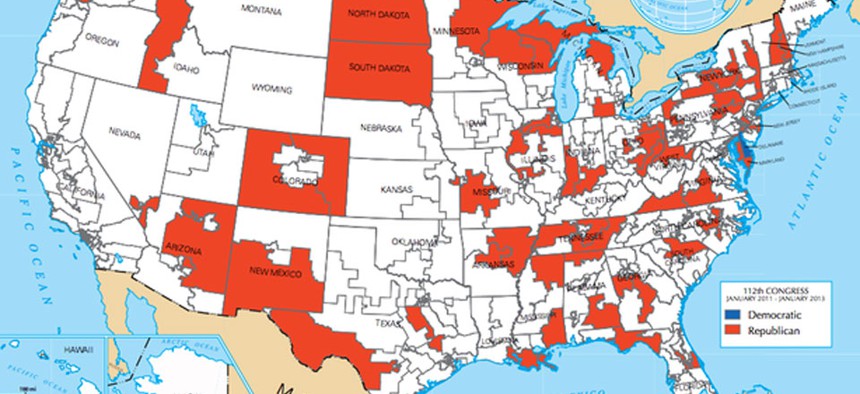
National Atlas
How a Deeply Unpopular Congress Keeps Getting Elected
Analysis finds fewer competitive races in 2014 than a decade ago.
As deeply unpopular as Congress is, most members of the House of Representatives who stood for re-election last year won their races — some 91 percent of the 390 people who wanted to return to the body. The Wall Street Journal, by way of the non-partisan Cook Political Report, suggested Monday that there are fewer competitive House seats than at any time in recent history. Which prompted Gawker's Hamilton Nolan to rail against gerrymandering, lamenting that "the shit that we tolerate in this country boggles the mind." As is often the case, however, it's not quite that simple. The problem may lie with the voters as much as the elected officials.
Yes, elected officials — and, moreover, political parties — seek to have congressional districts drawn in a way that minimizes the number of contested races every two years. It's in both parties' self-interest to do so, if not the voters': fewer competitive races mean less fundraising and staff needs. And Cook, which provides regularly-updated analysis of the competitiveness of each House race sees fewer competitive races in 2014 than a decade ago. The Journal:
Of 435 districts in the Republican-controlled House, the nonpartisan Cook Political Report rates only 90 as competitive, meaning those seats have a partisan rating that falls within five points of the national average. The rating measures how each district votes relative to how the country as a whole voted in the most recent presidential election.
The number of competitive districts as at its lowest since Cook first started the partisanship rating in the 1998 election cycle. That year, it rated 164 seats—more than one-third of the House—as "swing" seats that could back either party.
That was a high for the time period, mind you. As a Journal graphic indicates, by 2002, that figure was 111. By 2012, it had only dropped to 99.
NEXT STORY: So Much for Immigration Reform







